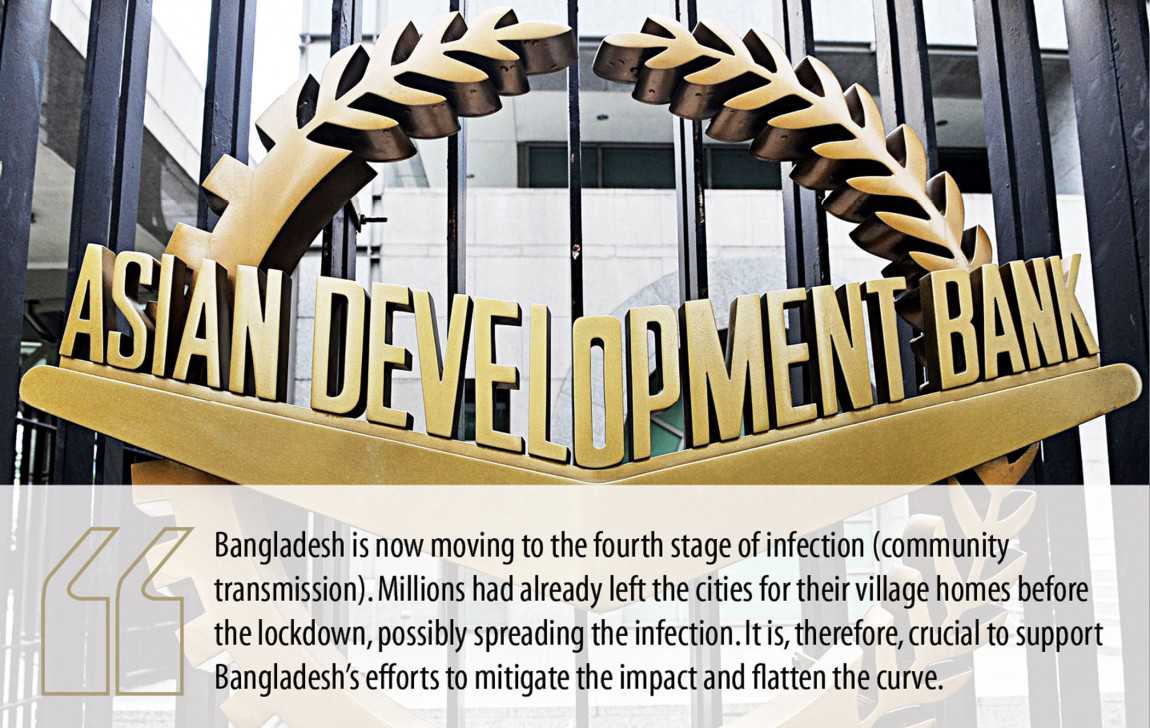ADB now forecasts economic losses of $13.3 billion

Collected
Where does this end? The Bangladesh economy now stands to lose an astounding $13.3 billion for the coronavirus outbreak, according to the Asian Development Bank, which is a lot more than four times how much damage the Manila-based multilateral lender had predicted back in March.
The estimated damage is now 4.9 % of the country's gross domestic product, up from 1.1 % as previously thought.
This implies the announced stimulus packages, which are equivalent to 3.3 % of the GDP, would fall short in countering the destruction due to the highly contagious, lethal virus from China.
Some 1.4 million to 3.7 million jobs would be lost for the monetary fallout for the countrywide general shutdown enforced since March 26 to flatten the curve on the novel virus, according to the ADB.
The pandemic will affect the economy through three main channels: a slowdown in domestic economies, sharp decline in exports and decrease in remittances, the ADB said in a project document delivered to the Economic Relations Division (ERD) of Bangladesh recently.
Subsequently, the Bangladesh government will seek $500 million in budget support from the ADB board on, may 7 to soften a number of the blows from the catastrophe, said an ERD official.
With 20.5 % of the population beneath the poverty line, and 10.5 per cent moving into extreme poverty, Bangladesh is particularly vulnerable to financial shocks including the one thrown up by the global coronavirus pandemic.
Any monetary shock would push a substantial proportion of the near-poor beneath the poverty line and deepen the poverty of these already poor, reversing previous gains manufactured in poverty reduction, the ADB document said.
Of the full total workforce, 85 % operate in the informal economy, leading a hand-to-mouth existence, and social distancing and quarantine measures mean their livelihoods are effectively vanquished.
The official unemployment rate is 4.3 % in Bangladesh. However, many used in the garment sector and micro, small, and medium enterprises may already have lost their jobs, and the monetary downturn will further dampen the employment market.
The poor are specially susceptible to infectious diseases such as for example COVID-19, because of overcrowding, unsanitary conditions, and poor usage of health services.
As initial support, the ADB has provided $350,000 technical assistance grant to address the outbreak of coronavirus disease and potential outbreaks of other communicable diseases.
Complementing these health sector interventions is a $500 million loan, comprising $250 million from ordinary capital resources lending and $250 million concessional loans for countercyclical support to handle downstream ramifications of increased spending on social protection, income support to workers, low-interest loans to affected sectors, and increased monetary supply.
A technical assistance grant of $1 million to aid strengthening the social back-up and institutional capacity in addition has been provided.
Bangladesh has undertaken a $113 million project to fight COVID-19 and improve preparedness, and as area of the project, the ADB on Thursday approved a $100 million loan.
The project will help meet the government's immediate and medium-term needs to avoid the spread of coronavirus, by supporting emergency procurement and the provision of the very most crucial medical equipment and supplies, the ERD official said.
The loan will carry 1 % interest rate yearly, with a term of 40 years, including a grace amount of a decade, repayment of principal at 2 per cent each year for the first a decade after the grace period and 4 % per annum thereafter.
High population density, rapid urbanisation, a sizable population of migrant workers, and a lot more than 20 % of its urban population moving into slums without adequate sanitation, make Bangladesh vulnerable to infectious disease outbreaks.
But Bangladesh has limited capacity to avoid, detect, and respond to public health emergencies.
Source: https://www.thedailystar.net
Previous Story
- ADB on Bangladesh: High outbreak of Covid-19 may...
- Bangladesh economy to stay strong if coronavirus challenges...
- ADB approves $300,000 aid to Bangladesh for tackling...
- ADB keen to create a cheque of $500m
- Coronavirus stands to clean $3b off Bangladesh economy
- ADB tasks losses for Bangladesh
- Bangladesh Economy Outperforming India AND FAR Of Asia
- ADB Provides Further $170 Million for Capital Market...